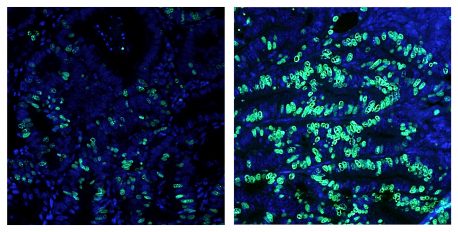
Click here for a high-resolution image.
Credit: Salk Institute
Experimental drug candidate slows cancer progression in mouse model. A new study suggests that high-fat diets fuel colorectal cancer growth by upsetting the balance of bile acids in the intestine and triggering a hormonal signal that lets potentially cancerous cells thrive. The findings could explain why colorectal cancer, which can take decades to develop, is being seen in younger people growing up at a time when higher-fat diets are common.
As cancer death rates drop overall, doctors have noted a frightening anomaly: deaths fro...
Read More








Recent Comments